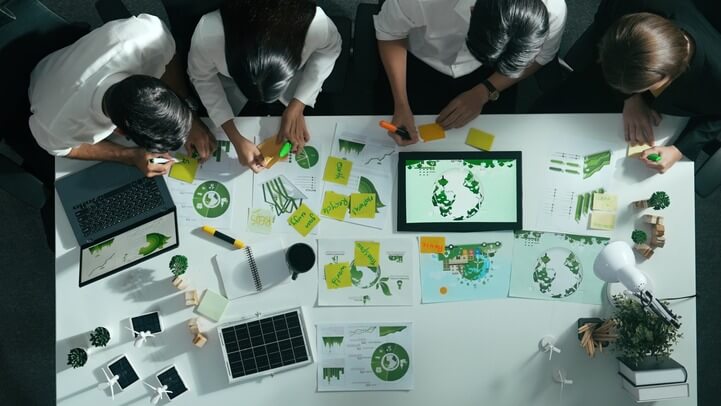
Environmental sustainability is a big deal these days, and industrial designers are at the forefront of this movement. They’re not just creating products; they’re thinking about what happens to them from start to finish, ensuring they don’t harm the planet. Enter circular product design – a game-changer in the quest for zero waste. It’s all about designing products that can be reused, recycled, and reimagined.
Why Circular Design Matters
The United Nations Industrial Development Organisation (UNIDO) highlights that industrial design is key to achieving the 2030 Agenda for Sustainable Development, especially Goal 9, which focuses on infrastructure, innovation, and sustainable industrialization. As businesses focus more on environmental, social, and governance (ESG) responsibilities, sustainable approaches are becoming the standard. Companies are now creating value for the business, society, and the planet.
APU’s Commitment to Circular Design
At APU’s School of Media, Arts, and Design (SoMAD), circular product design is central to the Bachelor of Arts (Honours) in Industrial Design program. APU is pioneering the integration of circular design into its curriculum, equipping students to create products that are durable, repairable, upgradeable, reusable, and recyclable, all while meeting ESG standards.
Unlike traditional recycling, which often leads to downcycling and lower-quality products, circular design focuses on upcycling, preserving, or enhancing material quality.
Meet the Innovators
Eekang Ooi, our SoMAD lecturer and Certified Industrial Designer (CIDe), is leading the charge. “We aim to eliminate waste by creating a closed-loop system where materials are perpetually reused or recycled,”
The lab has produced groundbreaking materials like Loriam and Doriam. Loriam, a bio-composite made from cardboard waste, is nearing commercial release, while Doriam, crafted from durian husks, recently drew significant interest at the World Industrial Design Day 2024.
Advantages of Circular Product Design Materials
Our economies currently use about 1.6 Earths' worth of resources annually, 60% more than the planet can regenerate. By 2050, this could rise to 3-4 Earths. Circular design materials have signficant benefits and can help combat this unsustainable trend, how?
Easy to Mould: These materials can be shaped with minimal energy and water usage, reducing waste and lowering the carbon footprint during production.
Closed-Loop Cycle: They can be reintegrated into the manufacturing process, keeping resources in use for longer and minimizing waste.
End-of-Life Solutions: APU students innovate take-back systems to disassemble returned products, recover materials, and create new products.
Shaping Future Leaders
Meet the dream team behind the Lestarial Sustainable Material Lab: Eekang Ooi, Liew Yong Kian, and Christine Lim Pei Shin. This lab, along with students from SoMAD and the School of Engineering (SoE), forms the Lestarial Research Team, a group dedicated to pioneering sustainable design. Liew Yong Kian, working on his PhD in sustainable materials-driven design, is all about integrating circular product design into the curriculum. Students here get hands-on with real-world design challenges, focusing on reuse, refurbishment, remanufacturing, and recycling.
“Our industry-veteran faculty provide expert guidance, fostering critical thinking and problem-solving skills,” Liew shared, highlighting the lab's commitment to equipping the next generation of designers with practical and impactful knowledge.
Lighting the Way: Making Impact
APU’s Industrial Design graduates are all about sustainable design. They’re not just creating products; they’re building a green economy by designing for circular ecosystems. Ever thought about how material selection and disassembly impact waste? These grads have, and they’re on it.
They focus on end-of-life options to minimize waste, acting as sustainability ambassadors and teaching everyone around them about responsible consumption. Lim emphasizes the importance of collaboration with sustainability-focused companies. These partnerships provide students with exposure to modern practices through guest lectures, workshops, and internships. This hands-on experience prepares them for careers in sustainable product design consulting, product design management, and entrepreneurship.
APU Graduates Leading the Green Revolution
APU students are no strangers to innovation. Remember WaterPod, the seawater desalination pod for sea nomads? It won the James Dyson Award 2021. Then there's Whalecro, an underwater vehicle with a micro-debris filtering system that grabbed the 2022 award. And let’s not forget Kuno, a sustainable cooler fridge that doesn’t need electricity. These projects are just a glimpse of the creativity and innovation flowing from APU.
These graduates aren’t just making cool stuff; they’re helping organizations achieve ESG compliance and driving a greener future. With the dual degree program with De Montfort University (DMU), UK, they’re making sustainable impact.
The Future is Circular
Circular design isn’t just a trend; it's the future of sustainability. Imagine a world where products are crafted with their entire life cycle in mind—built to last, designed to be reused, and destined to be recycled. APU is at the forefront of this movement, shaping tomorrow’s leaders in sustainable design. Our Lestarial Sustainable Material Lab is a hotbed of innovation, where students and faculty are pushing the boundaries of what’s possible. By focusing on circular design, APU is not only educating but also inspiring the next generation to think differently about the products they create.
Let’s transform the way we design, use, and recycle—one brilliant idea at a time.
 +60142521561
+60142521561






